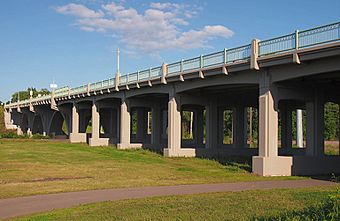Faribault Viaduct facts for kids
Quick facts for kids |
|
|
Faribault Viaduct
|
|

The Faribault Viaduct
|
|
| Nearest city | Faribault, Minnesota |
|---|---|
| Built | 1937 |
| NRHP reference No. | 89001848 |
| Designated | November 6, 1989 |
The Faribault Viaduct is a special kind of bridge in Faribault, Minnesota. It's made from strong reinforced concrete and helps Minnesota State Highway 60 cross over the Straight River. This bridge connects different parts of the city.
Contents
What is the Faribault Viaduct?
The Faribault Viaduct is a large bridge that carries a busy highway. It helps cars and trucks travel smoothly over the river and a former railway area. This makes it easier for people to get around Faribault.
Building the Bridge
The bridge was built a long time ago, in 1937. It was a big project during a time called the Great Depression. The Works Progress Administration (WPA) helped build it. The WPA was a government program that created jobs for many people. They built important things like roads, bridges, and parks.
The Faribault Viaduct has a unique look. Its design mixes two styles: Art Deco and Classical Revival. Art Deco is known for its sleek, modern shapes. Classical Revival uses ideas from ancient Greek and Roman buildings. This mix makes the bridge look both classic and modern.
Why is This Bridge Important?
The Faribault Viaduct is more than just a way to cross the river. It was a very important project for the city. Before the bridge, the river and train tracks divided Faribault. The viaduct helped link these parts together. This made travel and trade much easier for everyone.
In 1989, the bridge was added to the National Register of Historic Places. This is a list of important places in the United States. Being on this list means the Faribault Viaduct has special historical value. It's recognized for its design and its role in the community.
Modern Updates to the Bridge
Even though the bridge is old, it's still in use today. It was updated in 2008 and 2009. During this time, the bridge decks were made wider. This allows more traffic to cross safely.
However, the original parts of the bridge were kept. The strong piers (the supports holding the bridge up) are still there. Also, the three main arches that go over the river are original. This means the bridge still has its historic look and feel, even with modern improvements.
 | Selma Burke |
 | Pauline Powell Burns |
 | Frederick J. Brown |
 | Robert Blackburn |



